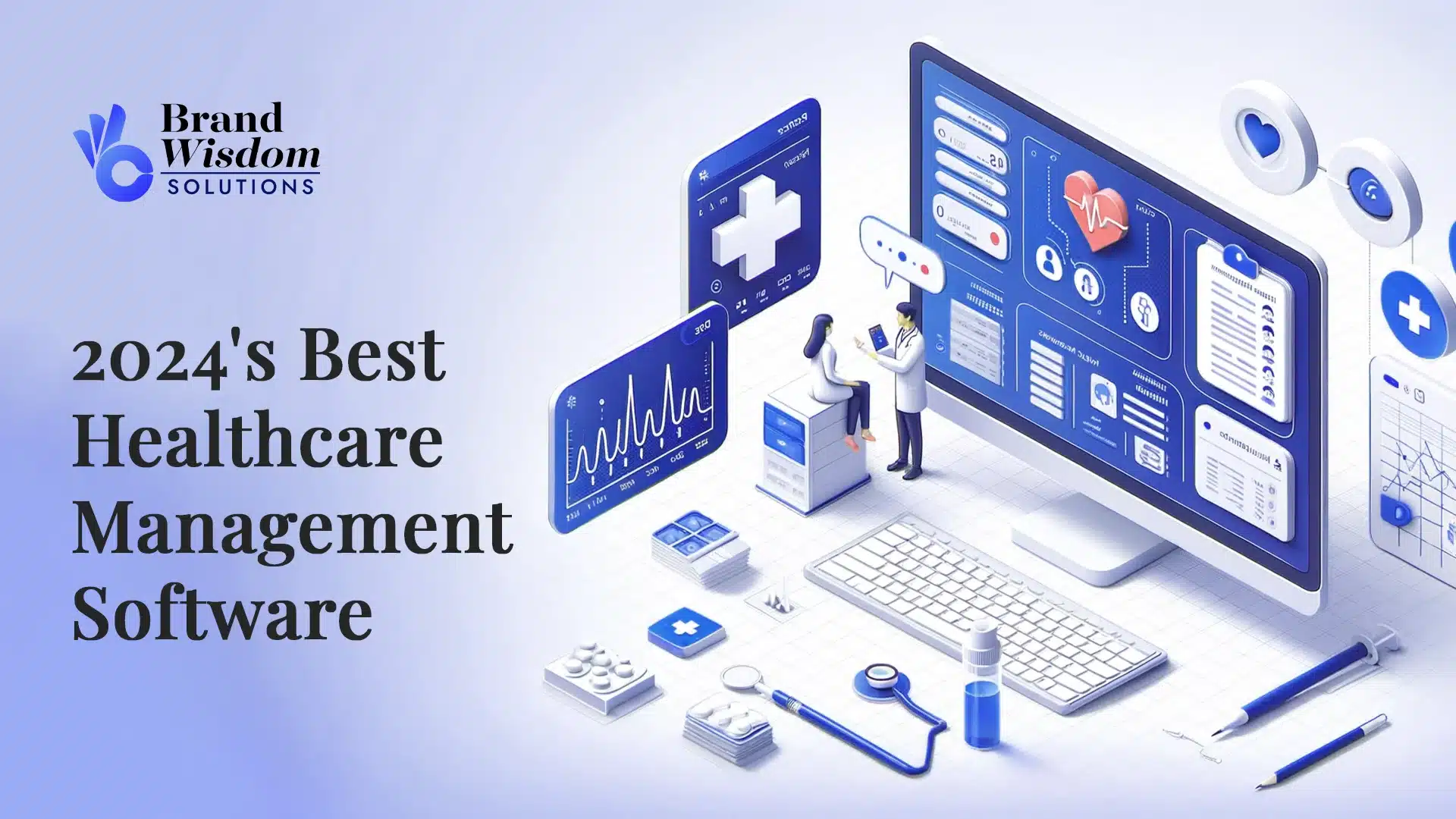In today’s fast-paced healthcare environment, selecting the best management software for your needs can be daunting. This article aims to simplify that choice. From discussing essential features to unpacking user reviews, we guide you through the best healthcare management software available in 2024. Whether you’re enhancing a small practice or integrating complex hospital systems, find the valuable insights you need to support seamless healthcare operations and high-quality patient care.
Key Takeaways
- Healthcare management software is critical for a wide range of healthcare providers and is essential to improve efficiency and patient care through features like scheduling and EHRs. The market for such software is projected to grow significantly.
- Electronic Health Records (EHR) are a fundamental component of healthcare management software, providing secure and convenient access to patient medical records, which is essential for patient care and compliance with healthcare standards.
- Advanced scheduling systems, patient portals, integrated practice management solutions, inventory and lab management, and robust data security are key features that enhance clinic operations and patient experience in healthcare management software.
Exploring Healthcare Management Software

The primary purpose of a clinic management system is to oversee all clinical operations comprehensively. It serves a broad spectrum of users encompassing:
- Individual Practitioners
- Hospitals
- Pharmacies
- Pathological labs
- various types of clinics, including primary care MDs/DOs, specialists, midsize to large clinics, and inpatient care organizations
Given that the healthcare IT sector is projected to reach a value of $662 billion by 2026, the significance of these systems is unequivocal. Addressing all the features, distinct needs and obstacles of the industry, medical software is instrumental in creating management systems and software solutions for healthcare professionals and institutions.
Key considerations when assessing patient management software include the size and complexity of the practice, the specific tasks and workflows needing management, and the level of integration required with existing systems.
Eliminating paperwork, improving efficiency, and ensuring consistent care across multiple providers are some of the unique challenges that clinics should prioritize when choosing software features. For example, Ray by Practo is a clinic management software suite that offers features such as convenient scheduling and rescheduling of appointments, while QMarksoft Clinic Management offers an EMR platform for tracking patients’ health history.
User reviews often highlight the user-friendly interfaces of these solutions and their ability to simplify the automation of clinical operations through digital records. In this context, most clinic management software aims to address the diverse needs of healthcare providers.
The Backbone of Healthcare: Electronic Health Records
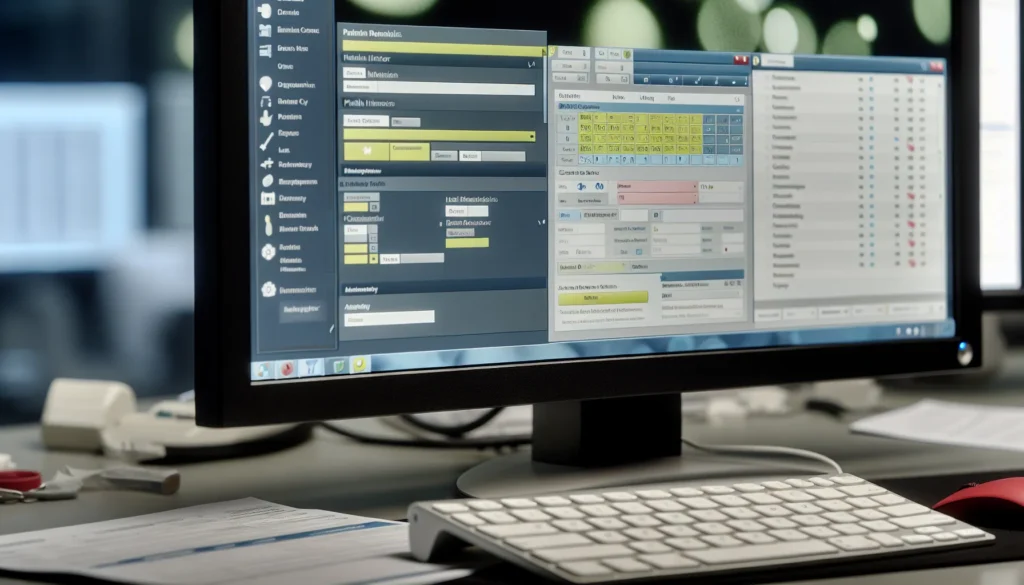
At the core of any effective healthcare management software is the Electronic Health Record (EHR), a digitized format utilized for the storage of a patient’s medical records and history. Besides facilitating convenient access to this vital information, it also constitutes the backbone of patient record management. EHRs enhance patient care by reducing paperwork, saving time, and minimizing the risks of data loss or misplacement.
Examples of medical practice management software employed in hospital management include:
- CGM APRIMA
- AdvancedMD EHR
- Medixcel EMR
- WebChart
These applications, along with others like HospiLogix, are important as they assist hospitals in achieving compliance with key healthcare standards like DICOM and HL7, which are fundamental for healthcare interoperability and data exchange.
Streamlining Patient Appointments with Advanced Scheduling Systems
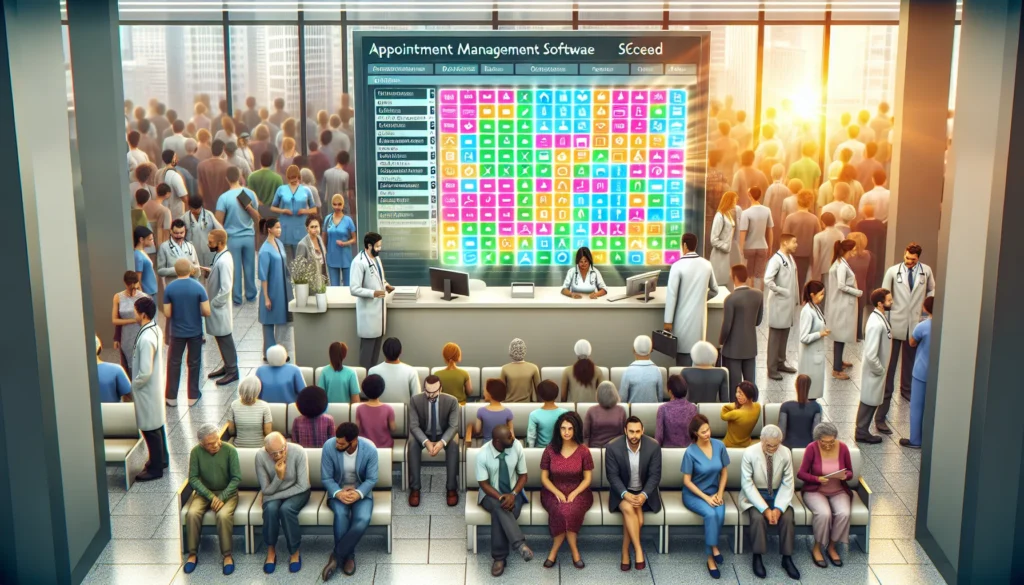
A key advantage of robust clinic management software is the advanced scheduling systems it offers – a critical tool that significantly impacts clinic operations. With the ability to:
- Consolidate inquiries and bookings from all sources onto one platform
- Accommodate walk-ins
- Send appointment reminders
- Automate processes
These systems make managing patient appointments a breeze.
Not only do these systems streamline the appointment booking process for clinic staff, but they also have a direct impact on patient no-shows. Studies suggest that automated delivery of appointment reminders to patients via email or SMS can significantly slash no-shows by more than 70%.
By automating the appointment booking process for more patients, advanced scheduling systems offer several benefits for clinics:
- Freeing clinic staff from the manual task of booking appointments, enhancing their workflows
- Customized scheduling features such as color-coded calendars, automated scheduling tools, integrated communication networks, in-app reminders, and messaging
- Streamlining and expediting appointment booking and management
- Providing a personalized approach that enhances the patient experience
Enhancing Patient Engagement Through Portals

Patient portals are a vital component within clinic management software. These patient portal features allow patients to retrieve their test results, prescriptions, and invoices, and the collaborative digital records system they provide has been shown to result in a 25% rise in appointment bookings with the same doctor.
Clinic management software improves patient engagement through the use of patient portals, by providing services such as sending digital copies of bills and invoices, as well as promotional messages and reminders for upcoming appointments, thereby contributing to overall patient satisfaction.
In conclusion, clinic management software plays a vital role in enhancing the patient experience.
By enabling patients to access their health information directly, patient portals promote proactive management of their healthcare, leading to higher levels of satisfaction.
Integrated Practice Management Solutions

Integrated practice management systems provide a wide range of functionalities such as appointment management, electronic health records (EHR), billing, and other features that facilitate seamless integration of various healthcare solutions, leading to improved operational efficiency and better management of healthcare practices.
These comprehensive solutions generally encompass functionalities for electronic medical records clinic data,, practice management, billing and revenue cycle management, as well as scheduling. These features collaborate to enhance healthcare practice efficiency.
Examples of integrated practice management software include:
- HARMONY Medical
- PracticeAdmin
- NueMD (a cloud-based software that encompasses integrated practice management, medical billing, electronic health recording, and appointment scheduling for practices of all sizes)
Optimizing Clinic Operations: Inventory and Lab Management
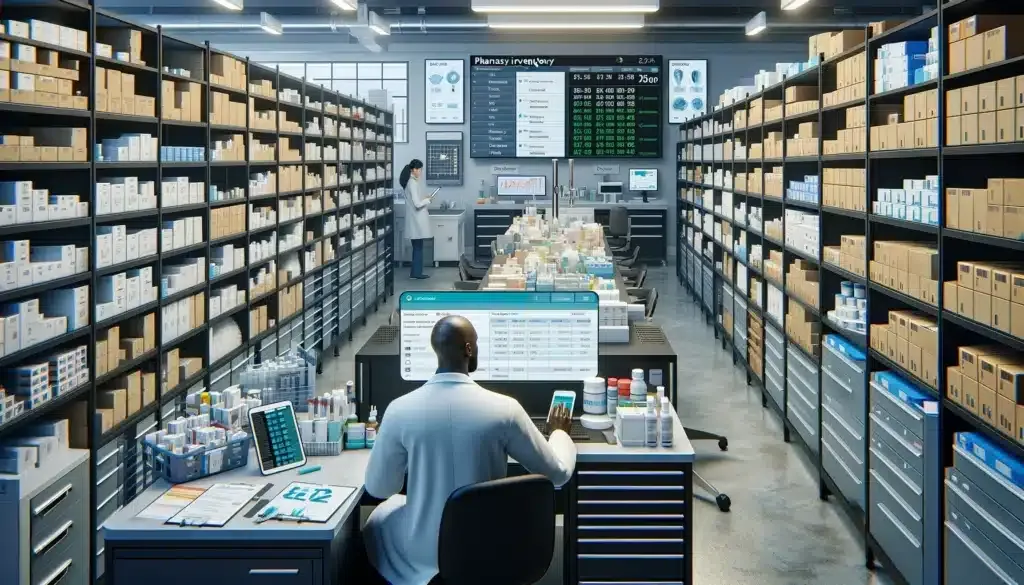
Efficient management of clinical inventory is essential for the success of any hospital facility. It aids in managing medical inventory, identifying discrepancies, and integrating various workflow tasks across multiple systems.
Inventory management software in healthcare provides real-time pharmacy inventory and stock information, identifies required equipment and supplies for procurement, accesses procurement data, and generates stock-related reports to facilitate efficient clinic storage space utilization.
Healthcare management software packages such as HospiLogix and MediSteer enhance pharmacy and laboratory operations by offering modules for pharmacy management and laboratory integration.
They aid in inventory control, optimize drug inventory, and include systems for tasks like sample collection and accounting functions.
Furthermore, medical equipment management software streamlines medical equipment maintenance, relieving healthcare personnel from the burden of carrying out numerous manual tasks related to medical equipment management.
Securing Patient Data with Robust Protection Features

Data security is paramount in healthcare management software as it ensures compliance with privacy regulations and bolsters patient trust. Critical to protecting patient information is adherence to regulatory requirements and implementation of robust security features.
Software like LeadSquared ensures data security and compliance by adhering to industry-specific and global security standards such as:
- Being HIPAA compliant
- Following the regulations of ISO 27001
- Complying with GDPR
- Adhering to AICPA SOC 1
Healthcare management software is equipped with inherent data security, encryption features, advanced security capabilities to prevent unauthorized access, as well as anti-spam and anti-virus modules.
Moreover, features like IP whitelisting, as implemented in Ray by Practo, ensure that the healthcare management system can be accessed only from secure and predefined locations.
Revenue Tracking and Financial Performance Analytics

Revenue Cycle Management (RCM) software aids healthcare providers in improving their management of the revenue cycle by automating various tasks that were previously carried out by human staff, such as billing and collections. Examples of RCM software include:
- ModMed
- Raintree Systems
- Cerner Revenue Cycle Management
- Remedly
- MedicsRCM
- DrChrono
- TELCOR RCM
- Veradigm Practice Management
- NikoHealth
- Waystar
- Rhyme
By streamlining patient billing processes, invoicing, insurance claims processing, and revenue tracking, these systems can optimize financial performance. MediSteer, for instance, offers a module specifically designed for insurance claims processing, underscoring the robust solutions available for financial performance analytics in healthcare management software.
Empowering Clinics with Mobile Accessibility

Mobile capabilities in clinic management software enable healthcare professionals to:
- Access patient records, billing, and accounting information from remote locations
- Oversee practice operations while away from the clinic
- Remotely monitor patients by utilizing healthcare software that facilitates consultations, examinations, and diagnoses without the necessity for the doctor and patient to be physically present in the same location.
Ideal mobile healthcare management software should include a variety of features such as:
- Engaging UX/UI design
- Health activity tracking
- Symptom checkers
- Appointment management
- Video conferencing
- User authentication
- Profile management
- Medication reminders
- Modules designed for different roles within a clinic, such as receptionists, physicians, nurses, pharmacists, and administrators.
Some popular mobile healthcare management software includes:

- Doctor on Demand
- Medisafe
- Clue
- SoftClinic GenX
- HISTree
- Docterz
- Super Clinic Management Software
- GTMS: Token Management
- Talkspace
- Teladoc
- PocketRx
- Cerner
- CareAware Connect
- DSS Inc
- Epic Systems
- MyChart
- Online
among others.
Simplifying Prescriptions: E-Prescription Writing Tools

E-prescribing software simplifies the process of prescribing medications and facilitates the granting, renewing, or suspending of prescriptions, making it more efficient for healthcare providers. A prescription management system, a component of online clinic software, is designed to:
- Store prescription information
- Receive prescriptions from doctors
- Transmit prescription details to patients and pharmacies
- Send billing information to the invoicing module.
E-prescription writing tools improve patient care by:
- Enhancing prescription legibility
- Reducing prescription time
- Making patient information readily available
- Improving accuracy and patient safety
- Lessening the paperwork burden for pharmacists
User Experience: Interface Design and Usability

In clinic management software, user experience (UX) is of great importance. Software with complex functionalities can lead to:
- User frustration
- Increased need for support
- Productivity decline
- Potential harm to reputation over time
Effective interface design in healthcare management software facilitates convenient access to critical treatment information, consequently enhancing user contentment and potentially contributing to improved patient outcomes.
The crucial components of effective interface design in healthcare management software encompass:
- Simplicity
- Clear menus
- Links
- Buttons
- Other interactive elements
All aimed at promoting usability and efficiency. Good usability contributes to provider satisfaction and helps prevent issues such as user frustration and productivity decline.
Customization and Scalability for Ambitious Clinics
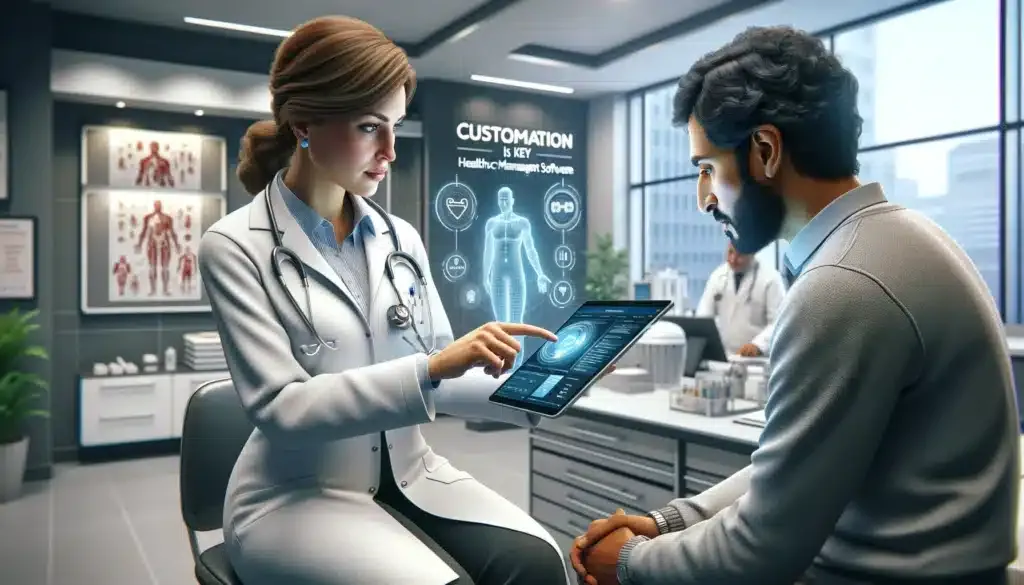
Customization is key in healthcare management software. It not only enhances the patient experience and fosters a meaningful doctor-patient relationship, but also provides efficient services, reduces administrative tasks, optimizes processes, improves patient management, and ensures regulatory compliance.
Customizable healthcare management software provides support for the distinct requirements of clinics, including healthcare services, by:
- Optimizing appointment scheduling
- Streamlining billing and administrative tasks
- Improving workflows and efficiency
- Enhancing patient management processes
- Ensuring compliance with industry regulations
Scalability plays a significant role in the growth of clinics and hospitals. It allows the management system to adapt seamlessly to changes brought about by expansion, promoting development instead of creating hindrances.
In the healthcare industry, scalability is particularly crucial as it enables healthcare providers to:
- Address the demands of a progressively intricate environment
- Accommodate an increasing number of patients
- Integrate new technologies and systems
- Expand their services and facilities
By prioritizing scalability, clinics and hospitals can ensure that they are well-equipped to handle future challenges and provide quality care to their patients.
Cloud-Based Clinic Management: The Future is Here
Known for their cost-effectiveness and ability to enable remote healthcare, cloud-based hospital systems are seen as innovative solutions in the healthcare industry. Notably, cloud-based clinic management systems present numerous cost benefits, including:
- Substantially lower initial licensing fees
- Decreased monthly expenses
- Enhanced cost-effectiveness in the long run when contrasted with conventional on-premise solutions.
Booking and Managing Appointments Made Easy

Through effective calendar management, coordination with healthcare professionals, and efficient booking capabilities, healthcare management software has significantly transformed the appointment booking process for patients.
The software also facilitates multi-location clinic scheduling and streamlines the booking workflow, delivering benefits to both patients and administrative staff.
By automating and streamlining the process, AI technology enhances the process of appointment booking and management.
This results in enhanced operations management in healthcare facilities and an overall more convenient and efficient process for booking appointments for both patients and staff.
The Impact of Automated Reminders on Patient Care

Automated reminders simplify patient participation in their care and enhance the overall patient experience, thereby positively impacting patient engagement and communication.
These reminders and alerts can be tailored to individual patients and can reach them beyond traditional clinic environments.
Automated appointment reminders have demonstrated a reduction in no-shows by as much as 60%, leading to a consistent level of scheduled appointments and a substantial enhancement in patient attendance reliability. Different types of automated reminders utilized in healthcare management software encompass:
- Reminders for postoperative tasks and questionnaires
- Text reminders for appointments
- Automated phone calls
- Emergency notifications
- Bulk emails
- Reminders that synchronize with health record systems
By streamlining the workflow, managing cancellations and rescheduling promptly, reducing patient wait times, enhancing service delivery, simplifying the scheduling of follow-up visits, medical errors, preventing double bookings, and ensuring adherence to critical treatment steps by clinicians, these automated reminders contribute to the optimization of clinic operations.
From Paper to Digital: Transitioning to Electronic Medical Records

For healthcare providers, transitioning from paper-based records of patient history to electronic medical records represents a major shift. They may encounter difficulties such as:
- Frustration
- Errors in patient care
- Reduced patient-clinician interaction
- Preparation
- Training costs
- Implementation costs
- Lack of a user-friendly interface
- Financial burdens
- Personnel resources
Additionally, there may be limited access to legacy records, data integrity issues, and resistance to change.
Offering a Comprehensive Solution with All-in-One Features
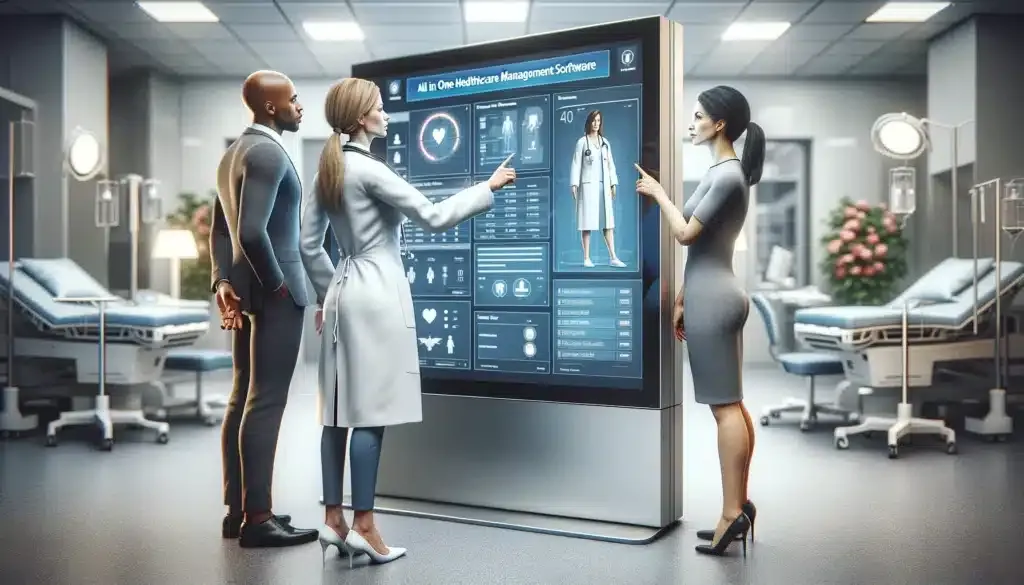
All-in-one healthcare management software boosts the efficiency of healthcare operations by:
- Ensuring convenient access to patient data
- Enhancing communication between patients and healthcare providers
- Cutting down the need for manual paperwork.
Typically, all-in-one healthcare management solutions encompass components such as:
- Expert solutions
- Automation of daily operations
- Documentation management
- Management of hospital processes and data transfer.
For instance, Practice Better is a comprehensive best practice management software and solution that incorporates integrated features for client engagement. Practice Better has a range of primary characteristics, such as:
- Practice management
- Web design
- Mobile app
- Billing
- Telehealth
- Client portal
Free Demos and Trials: Test Before You Invest
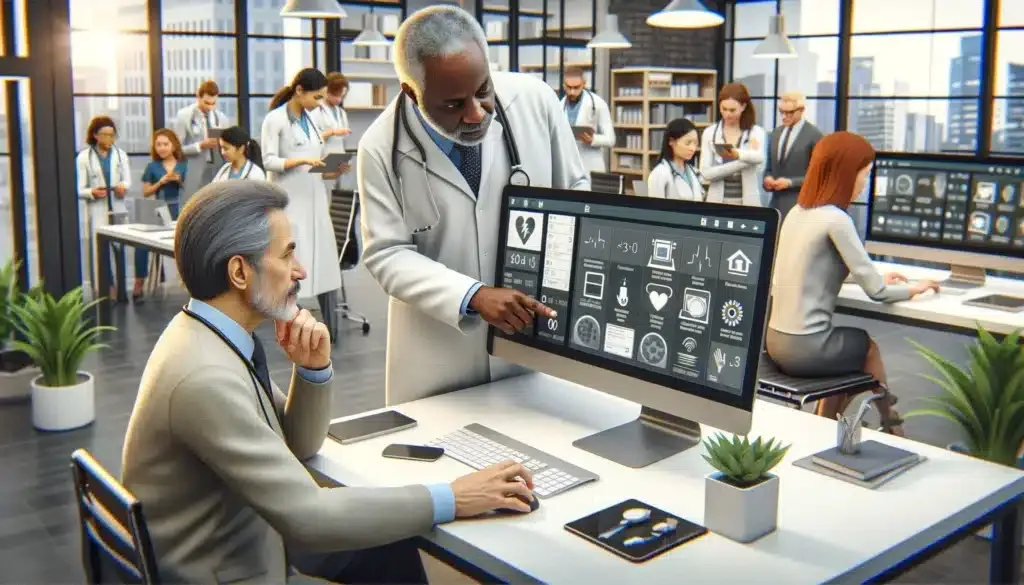
Demos and trial versions are valuable tools for becoming familiar with the clinic software and assessing its suitability for the clinic.
A complimentary trial of Ray by Practo can be commenced by accessing the provided link. Additionally, DocEngage provides the opportunity for a free trial, along with the choice of monthly or annual subscription arrangements.
DocPulse provides a complimentary trial for a limited duration before transitioning to a paid service. Additionally, a 15-day trial will be activated for any new practice added to your Ray account.
This allows you to explore and test out the new practice before making a commitment. It is always wise to test before you invest.
Summary

In conclusion, the digitization of healthcare operations through healthcare management software brings numerous benefits, from streamlined patient appointments to secure patient data, from mobile accessibility to e-prescription writing tools.
As clinics grow and evolve, so too should their management solutions, with customization and scalability being of utmost importance.
With the advent of cloud-based systems and AI technology, the future of healthcare management is promising. Remember, the right clinical software also is an investment in improved patient care and clinic efficiency. Consult with us to know the best solution for your Clinic.
Frequently Asked Questions
What is the best software for healthcare?
The best software for healthcare includes Electronic Health Records, Telemedicine, Hospital Management, and Health Tracking Apps. Consider these options for efficient healthcare management.
Which software is used in hospital management system?
The software used in hospital management systems includes MocDoc HIMS, which offers benefits such as data accuracy, security, revenue management, and improved patient feedback. It is a complete SaaS-based system that integrates all hospital information and connects all departments under one interface.
What is hospital ERP software?
Hospital ERP software is designed to manage financial processes, such as tracking expenses and income, to provide financial visibility and accounting information for healthcare businesses. This can help hospitals effectively manage their finances.
What is the importance of customization and scalability in healthcare management software?
Customization and scalability are important in healthcare management software as they enable the system to cater to the specific requirements and expansion of healthcare facilities. This ensures efficient and tailored support for healthcare operations.
How does a clinic management software enhance the efficiency of healthcare operations?
Clinic management software enhances the efficiency of healthcare operations by providing convenient access to patient data, streamlining communication, and reducing the reliance on manual paperwork. These features contribute to a more streamlined and effective healthcare environment, ultimately benefiting both patients and healthcare providers.

